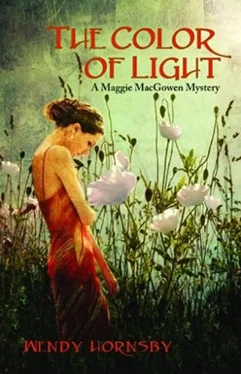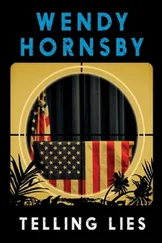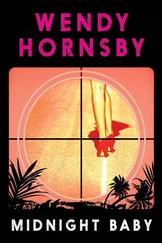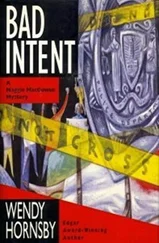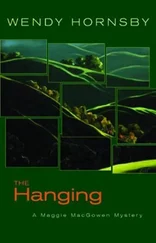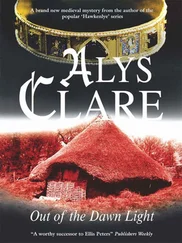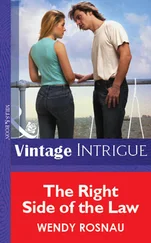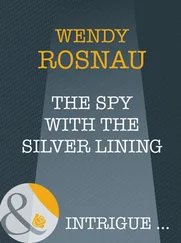“You, walk?” Kevin patted Beto’s round front. “At least something good happened out of this mess.”
“Beto,” I said. “Do you remember the secret way into my backyard?”
“Yeah.” If he was feeling a bit out of the loop before, he was thoroughly mystified now.
“Do you think you could still get out that way?”
He glanced down at the roundness Kevin had patted. “Got a ladder?”
Kevin rose and tugged on Beto to get him up. “I’ll give you a boost.”
“Where are we going?”
“We’re going to get your van. Maggie and Max can take it down to Oakland. On the way, they’ll drop us off at the store where you’re going to make me a great big pastrami sandwich and I’m going to tell you all my troubles.”
On his way toward the back door, Kevin pulled out his phone and told someone we were leaving.
I glanced at Max’s shoes to make sure his had rubber soles, saw that they did, and asked, “You ready?”
“Lead on, McDuff.”
We went out to the back corner of the yard, behind Mom’s vegetable garden. One summer while my family was away on vacation, with Beto’s help, Kevin, an amorous youth, had sawn through the back crossbeams of a two-foot-wide section of the redwood fence that surrounded the yard, and installed crude hinges. A hard push at the right place would open a piece of the fence wide enough for the boys to sneak through. That was the easy part.
To get to the back side of the fence, the boys first had to navigate their way up a narrow, concrete-lined rainwater run-off channel that ran between the backyards on my side of the street and the backyards behind ours, cross a weir where a second run-off channel intersected, and crawl through a culvert. The prize at the end of the obstacle course, if the boys were successful, was a little unchaperoned outdoor summer evening hanky-panky with their girlfriends; Beto was dating Sunny Loper from next door at the time, a situation her parents did not approve of.
And so, many years and quite a few pounds later, the four of us were going to run that course.
With surprisingly little effort, Kevin managed to pull the panel open on its rusty hinges.
Max looked through the opening and down into the run-off channel beyond with more than a little skepticism. He turned to me.
“Now I know why my brother was so worried about that boy.”
I had to smile, remembering how earnest Kevin had been on his mission to lose his virginity.
“You know what Mike would say?” I asked. “Love is a hurting thing.”
“That may not be all that hurts by the time this is over.” Max followed Kevin through the opening, paused and grinned back at me. “Always an adventure with you, kid. Always an adventure.”
The passageway outside the Oakland church basement door was packed with shopping carts, every one of them heaped with someone’s worldly goods: bedding, clothes, green trash bags full of cans and bottles redeemable for cash. A marmalade cat groomed herself in the sun atop the pile in one cart while a tired old mutt slept in the shade under another. A rich, human effluence filled the air as we made our way through the jumble.
The church ladies were just finishing with lunch service in the big fellowship hall. A few stragglers among their customers lingered over coffee, some in conversational groups, others off by themselves except for maybe the voices in their heads. A ragged man with a long, tangled beard played Rhapsody in Blue on the old upright piano at the far end of the room. The piano needed tuning, but he played with such expression, such beautiful phrasing that Max and I paused to listen before we went in search of Father John.
“He said he needed to sit down for a minute,” a woman clearing a table told us. “You might go up and check in the sanctuary. He enjoys the solitude there after the worst of the noise down here is over for the day.”
We found the sanctuary easily enough, but not Father John. The vast chamber was lit only by sunlight streaming through the stained glass windows on the east side of the chancel, very pretty, but not very useful. It took a moment for our eyes to adjust, but when they did we still saw no John; I had expected to find him on his knees before the chancel rail. I was about to suggest that we look elsewhere when I heard a little snore. We walked down the center aisle looking into the pews on either side until we found him, stretched out, his apron wadded under his head for a pillow. I sat down next to his feet and gave the toe of his sneaker a shake.
He awoke with a snort, seemed disoriented for a moment after he opened his eyes wide. Still lying on his back, he said, “Tell me I didn’t die in my sleep and here’s an angel come to take me away.”
Max laughed. “No such luck, Padre.”
John raised his head to look around me for the source of that voice. When he saw it was Max, he sat up and swung his feet to the floor.
“Well if it isn’t that old sinner, Max Duchamps.” He offered his hand to my uncle. “Good to see you, friend.”
“Been a while,” Max said. He nodded toward the altar. “You do realize this is a Presbyterian church, John.”
Father John, smiling, shrugged, good-naturedly dismissive. “Last I heard, the Presbyterians were Christians in good standing. They also made their commercial-grade kitchen available to feed the hungry, so who am I to quibble?”
“Are you all right?” I asked him.
“Oh, sure.” He rubbed his cheeks. “The chemo knocks me out sometimes. I have found that a house of worship on Monday mornings is just about the quietest place in town to catch a few Zs.
“So?” He turned an accusatory eye on me. “You told me you were too busy to help with lunch, but here you are. What brings you, child?”
I felt tongue-tied. I had delivered the sort of bad news I had come to give him before, but it does not get easier. Ever. I managed to say, “It’s about Larry Nordquist.”
“Not good news, I fear, about my AWOL cook.”
“Father John.” I put my arm around his shoulder. “Larry’s body was found this morning. He probably passed away sometime Saturday night.”
“Ah.” A shaft of blue light crossed his face as he looked up, crossed himself. A set of rosary beads appeared out of his pocket, wrapped around his hand. After a moment, as if speaking to no one in particular, he said, “I knew when I didn’t see him for a while that something had happened to him, but I didn’t expect that. No, not that. Not that.”
We sat in the sepulchral quiet of the sanctuary for a bit before Father John let out a long breath.
“An accident?” he asked.
“It doesn’t look that way,” I said. “And not by his own hand.”
“Thank you for telling me.”
Max asked, “Do you know how to get in touch with his family?”
“I do.” After another contemplative breath or two, he rose to his feet. “Can you give me a lift back to the rectory? There are calls to make.”
For the trip back to Berkeley, I conceded the passenger seat of Beto’s delivery van to Father John and climbed into the back. I upended a plastic milk crate, folded a shop rug to use as a cushion, and made a seat of sorts in the pass-through space between the two front seats. It was a familiar enough arrangement. From time to time, on weekends when I was in high school, if Bart needed servers for an event he was catering, Beto would press a few of his friends into service and we would ride to the event in the back of the van with the food. Bart worked us hard but he paid us well; I remembered it being fun.
The service pans and trays that had been used to deliver Hungry Ghosts party leftovers to the soup kitchen, now empty and carefully washed, were stowed on a shelf near the back door, ready for return to Beto’s deli. The pans and trays rattled around a bit, but overall, the short trip wasn’t unduly uncomfortable or unpleasant.
Читать дальше
